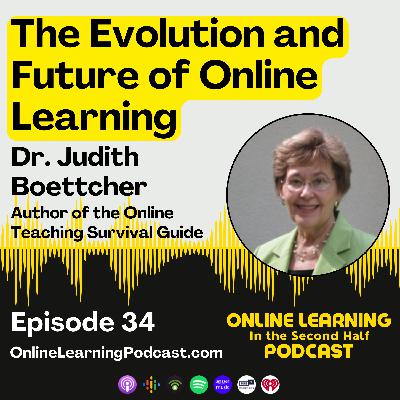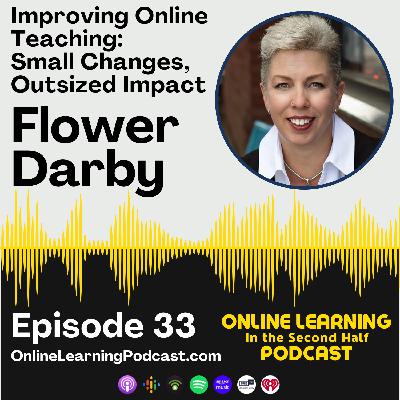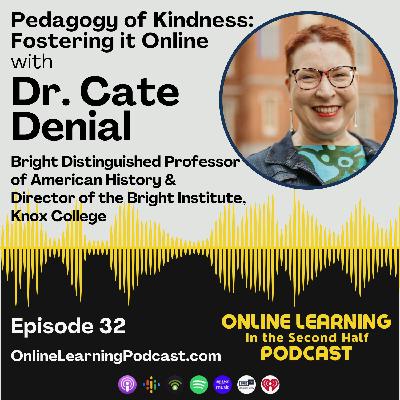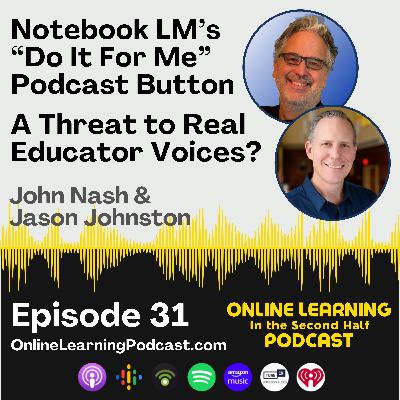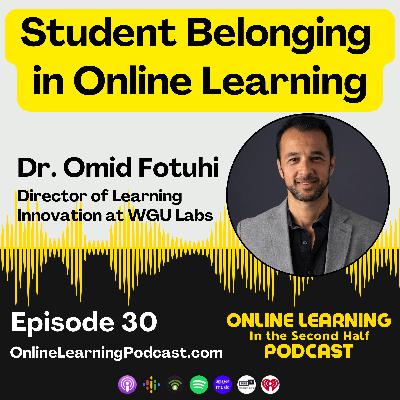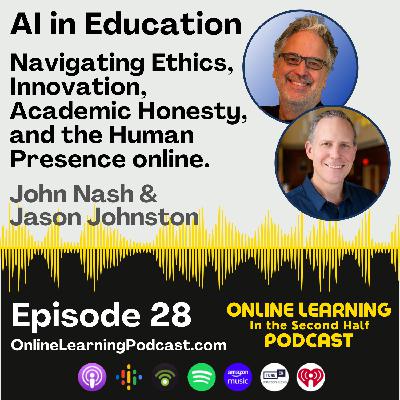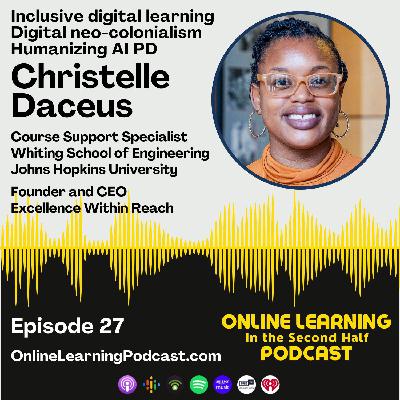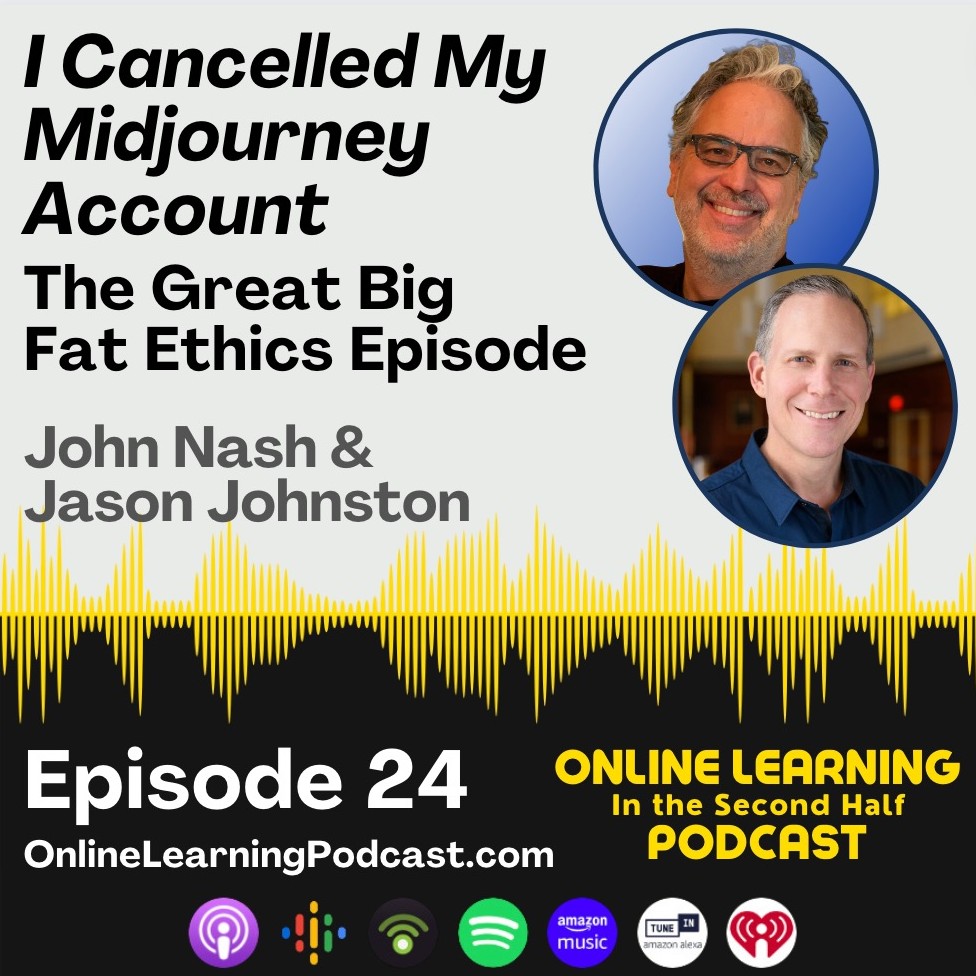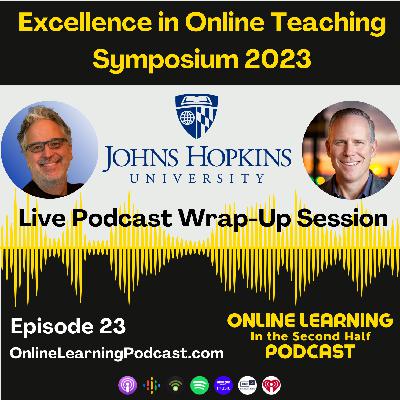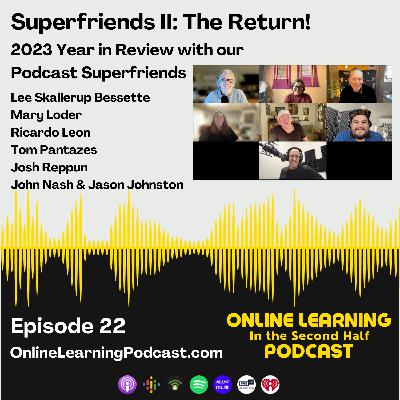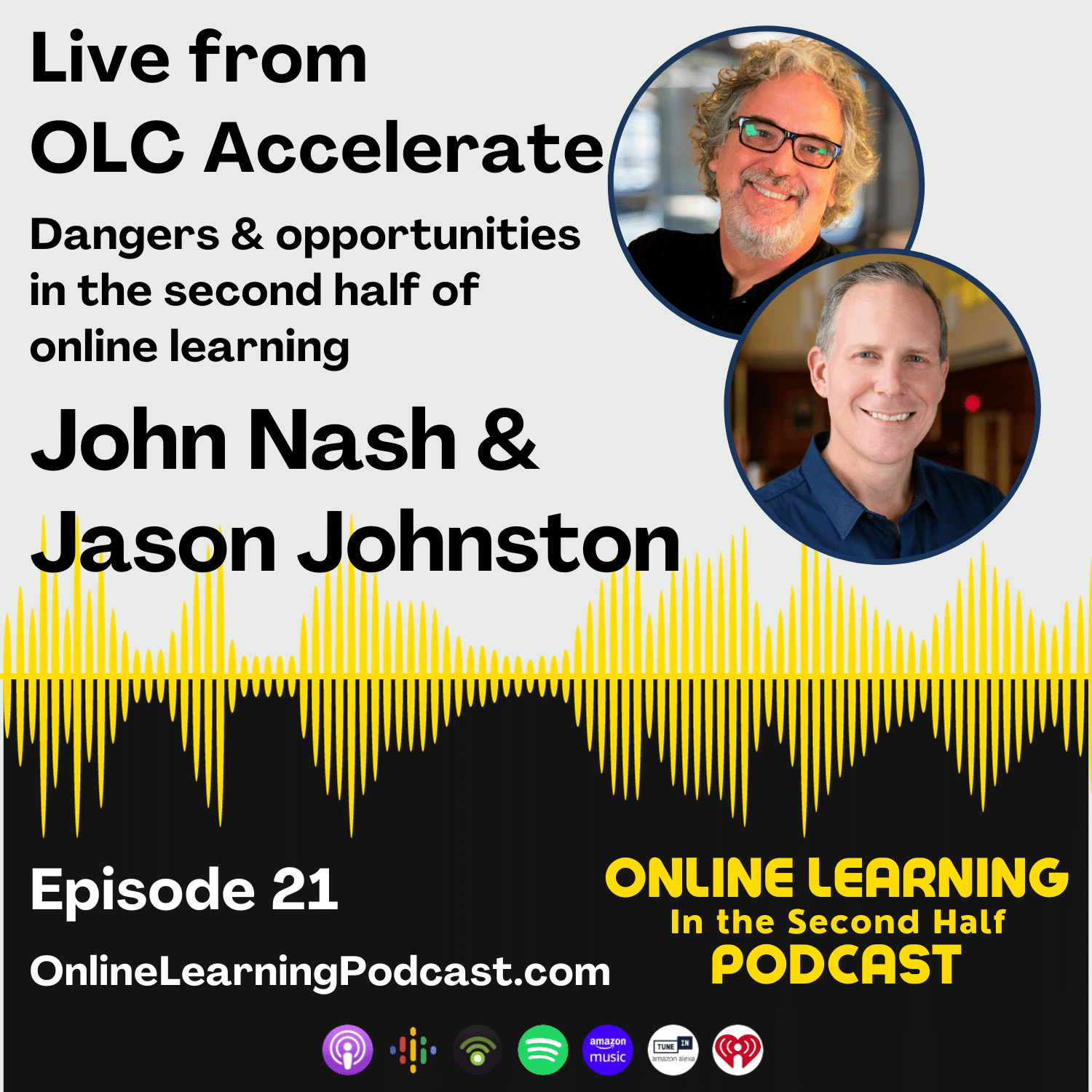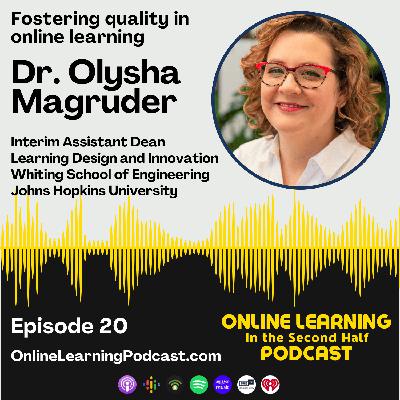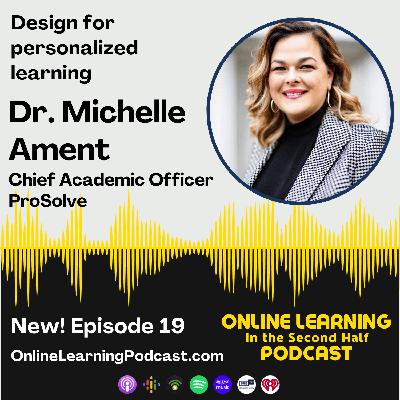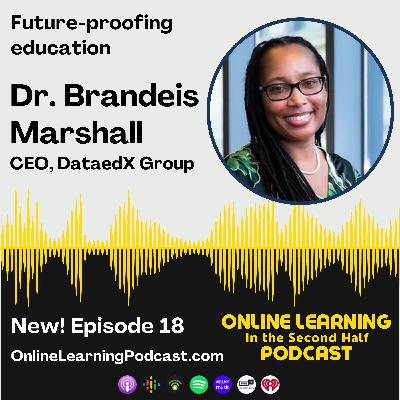EP 34 - The Evolution and Future of Online Learning with Dr. Judith Boettcher
Description
In EP 34, John and Jason discuss with Dr. Judith Boettcher the evolution of online learning, the importance of instructional design, and the centrality of student engagement. The conversation also touches on project-based learning, AI's impact on education, and the critical role of teacher-as-mentor. Tune in for an insightful discussion on making online learning more effective, human, and future-ready.
See complete notes and transcripts at www.onlinelearningpodcast.com
Join Our LinkedIn Group - *Online Learning Podcast (Also feel free to connect with John and Jason at LinkedIn too)*
Learn more about Dr. Judith Boettcher on her website: http://designingforlearning.info/about-dr-boettcher/
Resources:
- PLATO Computer System
- Judith’s Website
- Judith’s book: Online Teaching Survival Guide (2021)
- Jason’s other top Online Teaching Books
- Michelle Miller “Minds Online”
- Flower Darby - “Small Teaching Online”
- Catherine Denial “Pedagogy of kindness”
- Judith’s article: Student-Centered Learning in Dewey’s Holodeck – It Doesn’t Get Any Better than This—Now!
- IHE article - The Absurdity of Asynchrony
Theme Music: Pumped by RoccoW is licensed under an Attribution-NonCommercial License.
Transcript
We use a combination of computer-generated transcriptions and human editing. Please check with the recorded file before quoting anything. Please check with us if you have any questions or can help with any corrections!
[00:00:00 ] Jason: Today is a fulfillment of a little bit of a dream of mine. Do you know this? So thank you for helping me fulfill one of my dreams.
[00:00:06 ] Judith: Wow. Sounds like excellent planning, Jason!
[Intro Music]
[00:00:10 ] John Nash: I'm John Nash here with Jason Johnston.
[00:00:13 ] Jason: Hey, John. Hey, everyone. And this is Online Learning in the Second Half, the online learning podcast.
[00:00:19 ] John Nash: Yeah. We're doing this podcast to let you in on a conversation we've been having for the past. Wow. Are we going to start our third year of this soon? Yeah.
[00:00:28 ] Jason: I guess so.
[00:00:30 ] John Nash: About online education, online learning has had its chance to be great and some of it is, but still a lot of it isn't. So how are we going to get to the next stage, Jason?
[00:00:39 ] Jason: That is a great question. How about we do a podcast and talk about it?
[00:00:44 ] John Nash: I'd love to do that. What do you want to talk about today?
[00:00:47 ] Jason: Well, I'm very excited today, John, because we have a very special guest with us. Somebody that I've been reading her work now for a while and it is Judith Betcher. Judith, welcome.
[00:01:00 ] Judith: Well, thank you very much for being here. I'm delighted to be part of your series.
[00:01:04 ] Jason: Yeah, well, it's so great to have you. Judith, why don't you tell us just a little bit about kind of your your background? What have you been up to for the last little while? I know that a big part of your life is online learning and you've done it both in various capacities. So just tell us a little bit.
[00:01:19 ] Judith: well, actually, getting ready for this podcast, I started going back and thinking, and when you're as old as I am, that's kind of dangerous, you realize, and I thought, Oh my God, my first experience with anything approaching online learning was when I was working for a computer company and we were building and designing. What was called at that time computer based instruction.
So, as man, as we've moved along here, over these years, I was thinking it's actually online learning has become it actually is a merging of the computer based instruction movement with the traditional distance learning, in the old distance learning correspondence learning.
So what we have Today in 2025 is really elements of all of these different movements, starting back with the like I said, the computer based instruction movement.
[00:02:11 ] Jason: Yeah, that's great. And do you mind me asking what year that might have been with a computer based instruction? I just think it's interesting to think about historically our, trajectory with online learning.
[00:02:24 ] Judith: Yes, actually, I will confess that was the decade of the 80s and it was with control data corporation in Minneapolis, Minnesota. And at that time we built computer based instruction and it was designed. For the Plato system, which
was a mainframe computer application. And so then I'm afraid I have lived through moving from the mainframe application to the microcomputers, to the now, of course, to the powerful computers that we Carry in our pockets and our watches on our arms, it's been quite a journey to be honest, but after I finished that work at Control Data, that was when I went to Penn State and at that time for a few years there at Penn State. I Managed a group very similar to what it sounds like you do, Jason.
I had a group at that time, the folks at Penn State were very innovative and forward thinking, in that we, I had a group of instructional designers and video folks, and, programming folks, and we. Assisted faculty in, we actually would load up a van and put, computers, these huge computers, and take them around campus and set them up and say, wow, look what you could, Mr.
Faculty Member, what can, what, see what you can do with these computers. It was quite, it was, it's been quite an adventure to be honest.
[00:03:47 ] John Nash: You bring back memories, Judith, because my dissertation at the University of Wisconsin contained the word microcomputer in the title. Um, that's what the desktop computers were. They were like, just, yeah, it's funny. We still don't use that term because basically we're just all running microcomputer, microcomputers on our desks, but we don't use that anymore.
The Apple IIe days. Yes. Right. Yeah.
[00:04:10 ] Judith: Yes. Yes, exactly. But anyway, and to finish up a little bit after Penn State, I moved down here to Tallahassee, to Florida State, and in, in part of this time period, I did start consulting with with faculty who were teaching online at Duquesne University. in Pittsburgh, Pennsylvania. And as I, start was consulting and meeting with them, I started developing these tips and ideas and best practices.
And as you can anticipate, it was all of that work, the tips and the practices. When I found myself repeating myself over and over again, that was when I decided, well, maybe a book would be a good idea.
So that was kind of the genesis of the survival guide for teaching online.
[00:04:58 ] Jason: And that's really how I came to know you, Judith. and I was talking to John about this. Today is a fulfillment of a little bit of a dream of mine. Do you know this? Of being able to have you on the podcast. A little bit of a goal. So,
[00:05:09 ] Judith: No
[00:05:10 ] Jason: yeah, because these are the four books, and I'm being honest about this.
Well, three, these are the three books, actually, over a long time I've I have recommended to people. And then I've added one,
in the fall Michelle Miller's "Minds Online." Flower Darby's Small Teaching Online, and then your book, the Online,
Teaching Survival Guide. And then recently added, because it just came out in the fall, Catherine Denial's Pedagogy of Kindness, which is not an online book, but is such an important book, I think, particularly for this day and age. So those are my four book recommendations for people that want to get going online with practical tips and not so much from a development standpoint, more from a teaching standpoint. So first year we had Michelle Miller on the show, and then last year we had Flower Darby and Catherine Denial on the show, and now you are joining us today.
So thank you for helping me
fulfill one of my dreams.
[00:06:08 ] Judith: Wow. Sounds like excellent.
[00:06:15 ] Jason: Well, and it wasn't actually too calculated, except that, as John and I are talking just about what kinds of, people and conversations we want to have on this show, we realized we started almost two years ago. And, we realized we kind of just jumped into things. We started talking about making your online courses more human and creating student agency. And we talked a lot about AI and about some of the risks and challenges and opportunities around that. And we haven't really gone back to talk about more foundational teaching online.
Because it's online learning in the second half, we're kind of positioning it as looking back on the first half of online learning. Now, , we know how to dump information on people now online, right? We can do it.
What do we hope for in our second half of online learning? And as John and I are peering into our second halves of life and well into our second halves of lives, we're thinking abo

